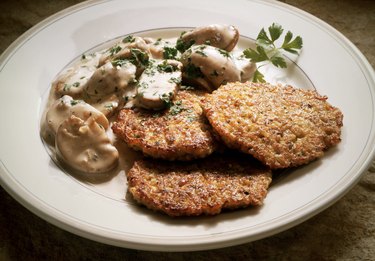
At 6 g of protein per serving, millet is a good choice to help vegetarians meet their protein needs. It's gluten-free, so people with celiac can consume without fear of intestinal damage, and according to the USDA Nutrient Data Laboratory, its magnesium, phosphorus, potassium and lutein content make it nutritious. If you have frequent bowel trouble, including millet as a regular part of your diet may help keep your digestive system running smoothly.
Whole Grain
Video of the Day
Millet is eaten as a whole grain, meaning you eat the germ, the endosperm and the bran together. Unlike white rice, cornmeal or rolled oats, millet is minimally processed. Millet contains more fiber than most refined grains, with about 2 g of fiber per one-cup serving, but not as many other whole grains. Quinoa, for example, has 5.2 grams of fiber per cup. According to MayoClinic.com, fiber benefits your cardiovascular system and can help prevent diabetes as a regular part of your diet.
Video of the Day
Fiber
Whether you have constipation or diarrhea, an adequate fiber intake may help provide relief. Instead of stimulating or slowing the bowels, fiber regulates both conditions to return bowel regularity, according to MayoClinic.com. Insoluble fiber adds bulk to the stool, which can help move a slow bowel or help add form to a loose stool. Soluble fiber turns into a gel in the intestine, which can lubricate a dry digestive tract or help soothe an inflamed one. Like most grains, millet contains both types of fiber. When they work together in adequate amounts, your bowels may function more smoothly and predictably.
Anti-Inflammatory
According to chef and nutrition consultant Rebecca Katz, millet has anti-inflammatory properties. The intestinal lining can become inflamed from conditions like ulcerative colitis, Crohn's disease, celiac disease or reactions to medications. The inflammation causes abdominal pain and can result in diarrhea. Although they are not a substitute for medical care, anti-inflammatory foods like millet may contribute to the healing process and help reduce the frequency or severity of symptoms.
Including Millet
If your fiber intake is low, increase it gradually. Otherwise, you may experience gas, bloating, flatulence and a temporary worsening of your bowel condition. Begin by replacing low-fiber foods with fiber-rich substitutes. Instead of mashed potatoes, try millet. Cook it like rice for a fluffy dish, or prepare it like risotto for a creamier dish. It can be substituted for cornmeal in polenta, or try a puffed millet breakfast cereal. If your bowel problems are severe or are accompanied by other symptoms, consult your doctor for treatment.